Amazon Echo Studio review: best sounding Echo by far assails Sonos One with hi-def and 3D audio
Amazon Echo Studio is excellent but you do need an Amazon Music HD sub to get the full effect

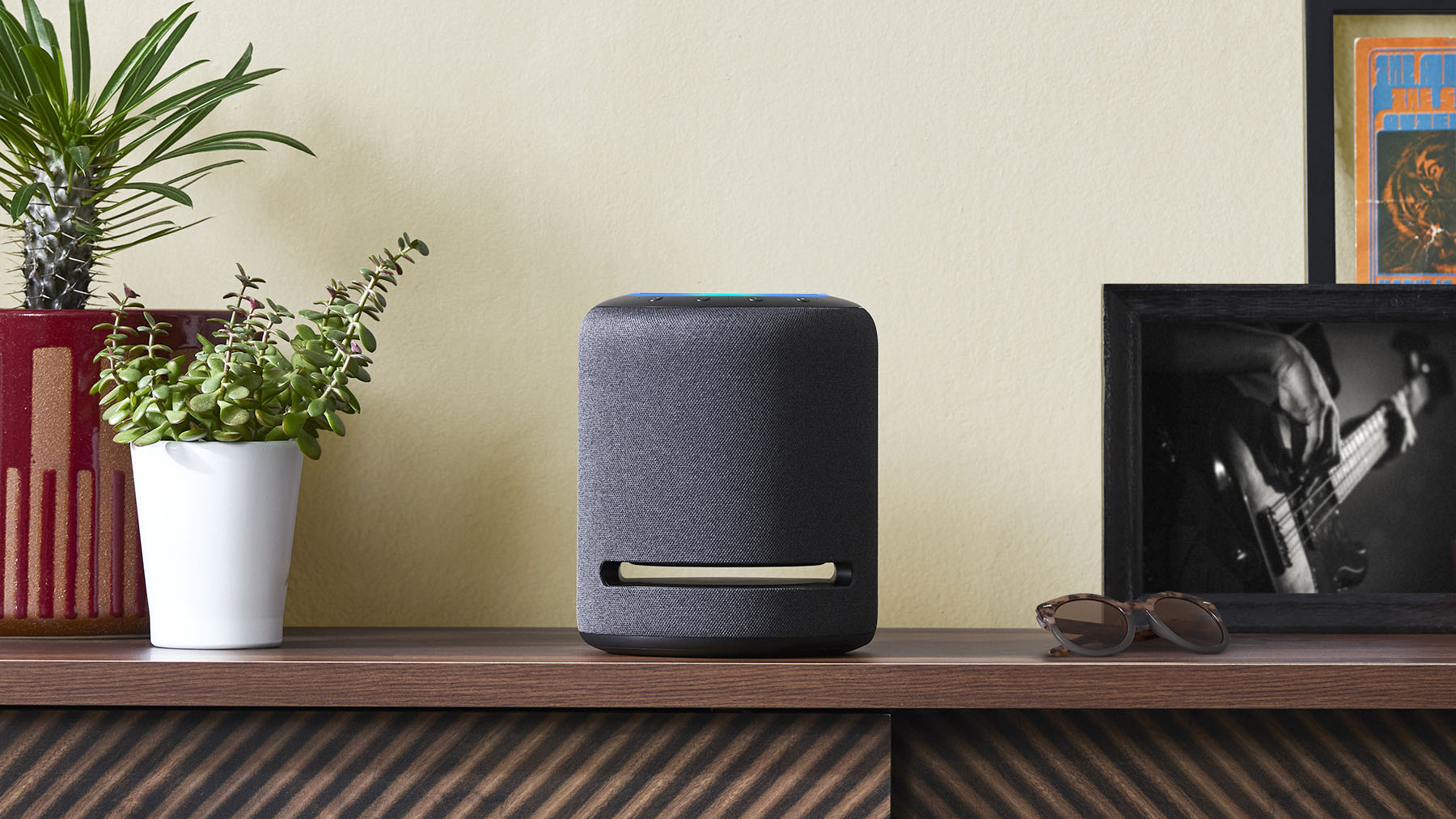
Amazon Echo Studio has a bigger sound and lower price than key rival Sonos One. It's also somewhat less refined but that shouldn't stop it selling well
-
+
Best sounding Amazon Echo speaker to date
-
+
Support for CD-quality sound, hi-res audio and 3D audio
-
+
£10 cheaper than Sonos One
-
-
'Ultra HD' and 3D audio are of questionable value
-
-
Not the sexiest thing
Why you can trust T3

Amazon Echo Studio fills a long-time gap in the Echo range: it's the Echo that sounds unquestionably good. While the Amazon Echo (4th gen) takes a step forward in this area, and the Echo Dot (4th gen) sounds better than nothing, the Echo Studio is here to replace, or at least take on, 'proper' speakers.
To that end it's got oodles of bass, support for HD and UHD (CD quality and hi-res, respectively) music files from Amazon Music HD and an array of drivers that includes an upward-firing one, giving support for 3D audio and potentially letting it serve as a rear Dolby Atmos speaker. You can also pair two as a stereo duo, or connect as many as you like together as part of an Amazon Echo multi-room speaker system, along with any other Echo devices you may own.
Or, to put it another way, it's a Sonos One rival. Sure, there are plenty of other wireless speakers we could compare it to, but the Sonos One is market leader at this price.
Amazon Echo Studio review: price and release date
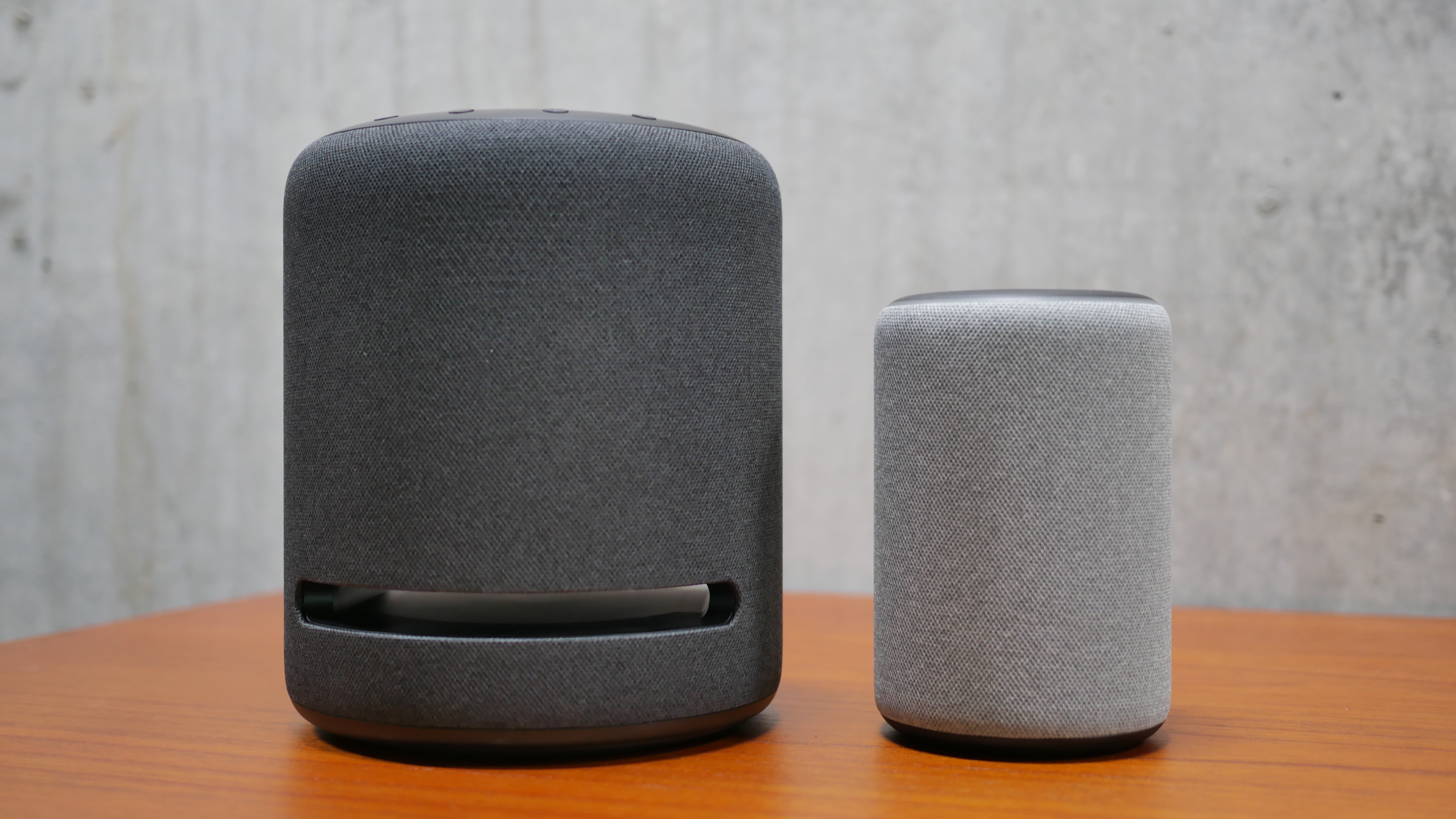
Echo Studio next to the Echo (3rd gen)
The Amazon Echo Studio was released on November 7th, 2019. It costs £189 / $199 / AU$329. That's marginally less than a full-price Sonos One, although marginally more than a Sonos One SL – but the One SL does not include Alexa.
With Amazon's Black Friday deals approaching, we'd expect perhaps 20% to 30% off the Echo Studio, which would make it really strong value for money.
Amazon Echo Studio review: does it sound good?
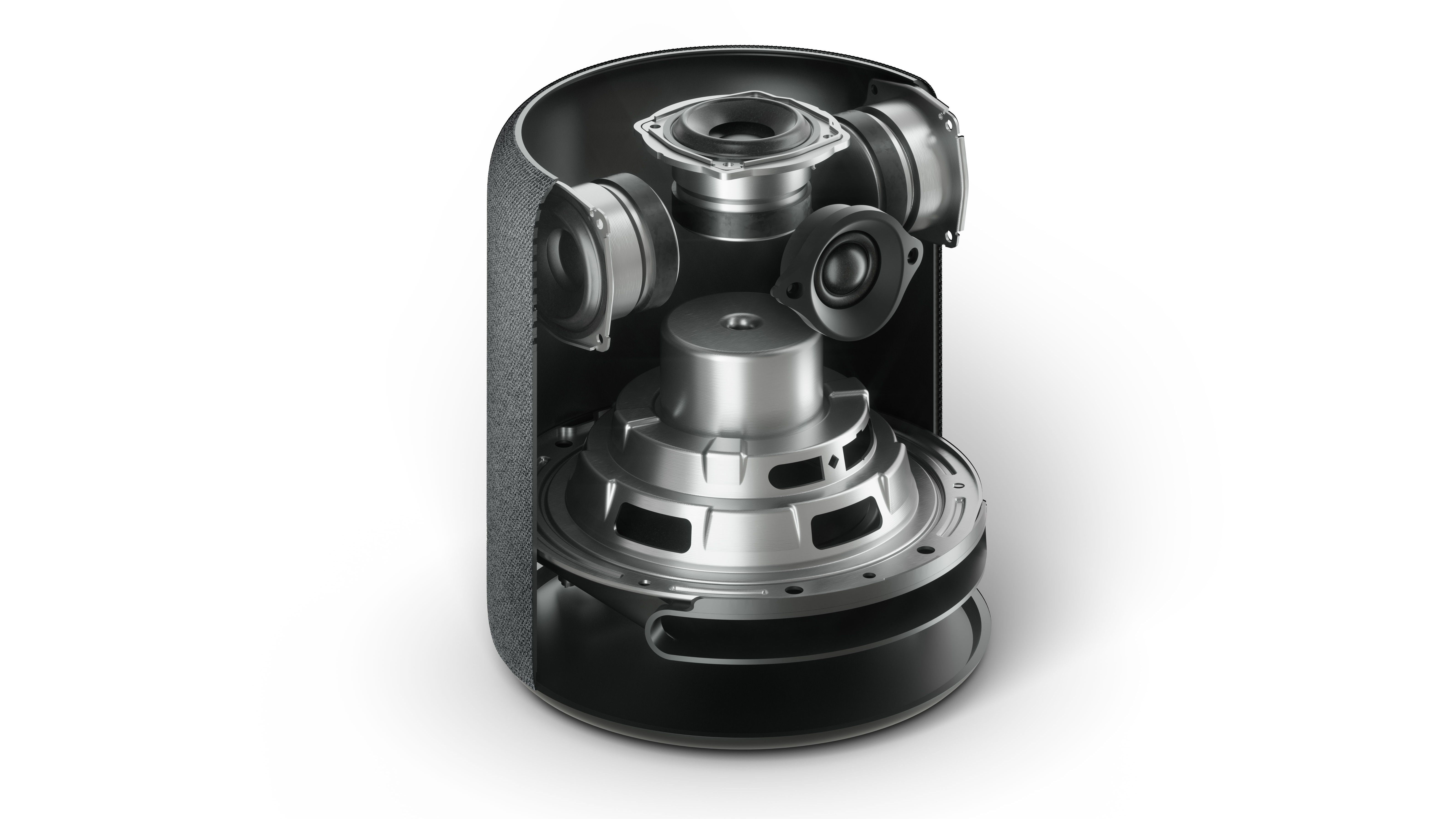
Echo Studio out-muscles Sonos with hi-res audio support, a bigger woofer and an upward firing driver
Amazon Echo Studio has a BIG sound. As well as a 3.5-inch woofer, there's a dedicated tweeter and two mid-range drivers, positioned to provide stereo – or something quite like it – via 'specially enhanced' Dolby Atmos-based processing. Phew.
Uniquely in this market, there's also an upward-firing mid-range driver, giving further support for Dolby Atmos as well as '3D Audio' music. There is not an awful lot of music available in 3D at present – even Amazon's own 'best of 3D audio' Alexa playlist is fleetingly brief – but it does sound… interesting. Obviously the killer app here will be when (if?) Amazon is able to provide the likes of Pink Floyd's and Muse's back catalogues in 3D. At the moment you'll have to make do with, er, Slick Rick and Chaka Khan.
Get all the latest news, reviews, deals and buying guides on gorgeous tech, home and active products from the T3 experts
The presence of an up-firing driver also means an Echo Studio (or pair of them) could at some point be used as rear surrounds in an Amazon Dolby Atmos home cinema setup. No such thing exists at present, however.
Amazon Echo Studio also, naturally, supports CD-quality and hi-res audio from its recently upgraded Amazon Music HD streaming store. Perhaps inevitably, it does not support hi-res files from rivals Qobuz or Tidal. The way Echo Studio sounds means hi-res, 'UHD' tracks don't sound that much better than the CD-quality 'HD' ones, at least to my ears. However, both sound way better than the 'standard-def' MP3 tunes used by Spotify, which is also natively supported by Amazon Alexa. Other streaming services can only be hooked up via the Echo Studio's Bluetooth connection, for the time being.
The Amazon Echo Studio sounds bigger than any approximately-£200 speaker I can think of. Certainly bigger than Sonos One. Whether you think it sounds better or not comes down to what you want from a speaker. If it's sheer oomph, Studio wins. If you want more of a refined, 'hi-fi' kind of sound – and from a much nicer-looking device, it must be said – the Sonos One is arguably still preferable.
You can also use a much wider selection of streaming services with a Sonos. If you're an Amazon Music HD subscriber however, nothing is going to get more out of it than the Echo Studio.
Actually, although it's usually a big-sounding speaker, a slight deficiency that Amazon Echo Studio has is that it's clearly happier with more contemporary sounds than a lot of what's generally thought of as 'classic rock'. Electronic music and hip-hop in particular can sound quite immense, and Muse comes out pretty well too, but tracks by Led Zeppelin or Metallica that sound crushing on most speakers are rendered weirdly polite and thin.
Perhaps counter-intuitively, considering that, classic soul, funk, reggae/dub, jazz and classical sound pretty good via Amazon Echo Studio, although nobody is going to mistake it for a reference system.
Amazon Echo Studio review: design, features and Alexa
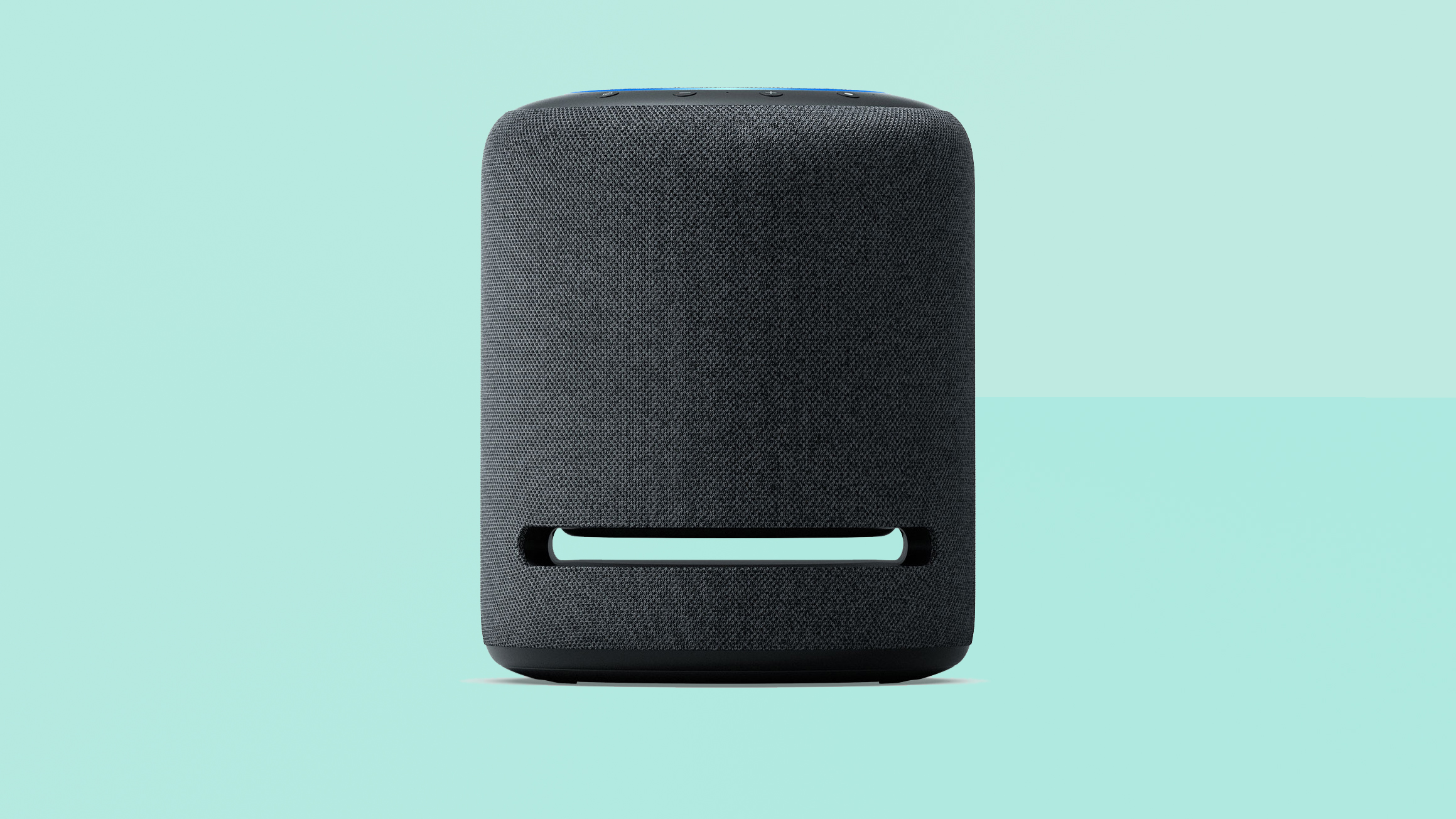
Amazon Echo Studio is not a beautiful thing
The Echo Studio sounds big and powerful, if a bit lacking in refinement, and that's also what it looks like. It's like a standard Echo that's gorged on protein shakes and burgers, and come back looking hella swole. Big light ring, big bass port, big… everything really.
To my eyes the result is quite ugly but not full-on offensive. It's a bit like an Apple HomePod with all the nice little design elements stripped out, so as to get the price down below £200. Well, that's fair enough.
As with all recent Echo speakers, Amazon's hi-fi bruiser is very easy to setup, especially if it's not your first Echo speaker. Just download/fire up the Alexa app, add a new device, and you're home and hosed in a matter of minutes.
You can then access Alexa – in rather more booming-voiced form than usual – for all her usual range of news, music, Hue-light-controlling and fart-noise-generating magic tricks. Disappointingly, Amazon doesn't seem to have found a way to make the mics pick up your voice over loud music without the need for shouting but that's okay; I find yelling at Alexa quite cathartic.
With the focus here being so firmly on music, it's worth noting that Alexa is still very good at finding popular/classic and recent tunes and still a massive pain in the ass if you're after something more obscure. Asking for remixes of songs in particular is usually a nightmare scenario that will soon have you scurrying to the Alexa or Amazon Music apps instead. Getting the right outcome when asking for a song that is also an album title (or vice versa) is also very much not straightforward.
In ten years' time it will be so nice to speak to Alexa very much like a real person. For now, its difficulties in parsing what you're saying means you have to remember this is still very much a work in progress, and talk to it as if it is a moron, or someone who speaks English only as a third language.
Amazon Echo Studio: verdict
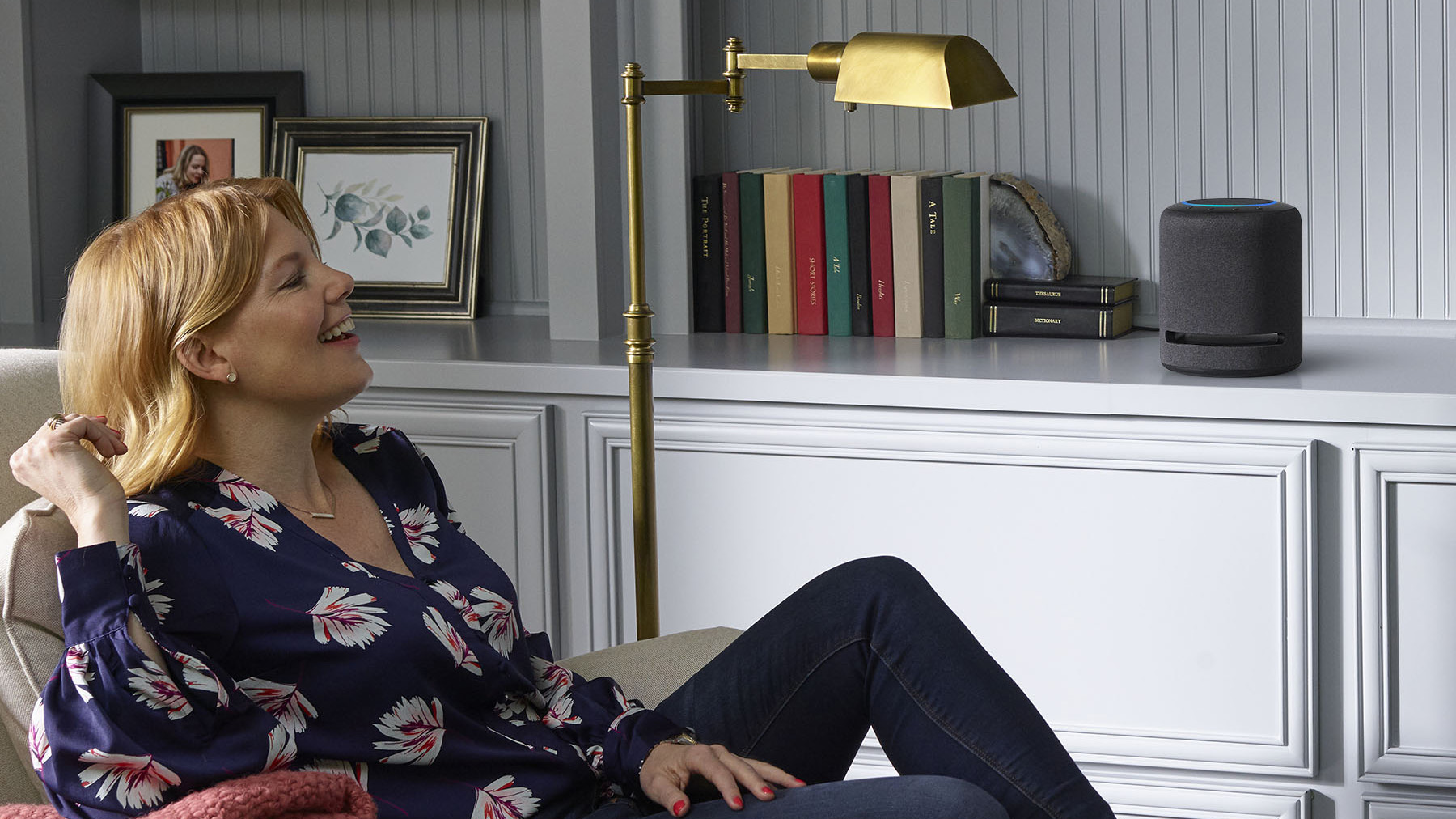
Amazon Echo Studio: this lady loves it… And so do we
Amazon Echo Studio is a huge leap forward in terms of sound quality over previous Echo speakers and it's well worth £189.99. So long, that is, as you're an Amazon Music HD subscriber, although it's a solid performer with Spotify as well.
If you use any other streaming service there are better options available… but then perhaps you should consider switching to Amazon Music or Music HD. Both are keenly priced compared to their rivals and have just as many tunes on offer, all searchable – with the caveats noted above – by voice. And if voice search gets annoying, you can always use your phone, tablet or laptop.
Echo Studio is a classic Amazon product. It won't win any design awards but it looks acceptable, it's excellent value for money, and if you get fully on board with Amazon's services and eco-systems, it's a real winner.

Duncan is the former lifestyle editor of T3 and has been writing about tech for almost 15 years. He has covered everything from smartphones to headphones, TV to AC and air fryers to the movies of James Bond and obscure anime. His current brief is everything to do with the home and kitchen, which is good because he is an excellent cook, if he says so himself. He also covers cycling and ebikes – like over-using italics, this is another passion of his. In his long and varied lifestyle-tech career he is one of the few people to have been a fitness editor despite being unfit and a cars editor for not one but two websites, despite being unable to drive. He also has about 400 vacuum cleaners, and is possibly the UK's leading expert on cordless vacuum cleaners, despite being decidedly messy. A cricket fan for over 30 years, he also recently become T3's cricket editor, writing about how to stream obscure T20 tournaments, and turning out some typically no-nonsense opinions on the world's top teams and players.
Before T3, Duncan was a music and film reviewer, worked for a magazine about gambling that employed a surprisingly large number of convicted criminals, and then a magazine called Bizarre that was essentially like a cross between Reddit and DeviantArt, before the invention of the internet. There was also a lengthy period where he essentially wrote all of T3 magazine every month for about 3 years.
A broadcaster, raconteur and public speaker, Duncan used to be on telly loads, but an unfortunate incident put a stop to that, so he now largely contents himself with telling people, "I used to be on the TV, you know."